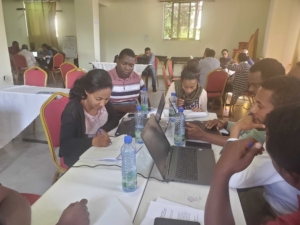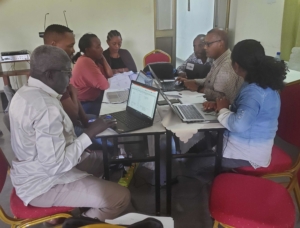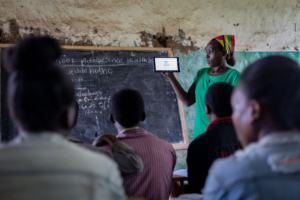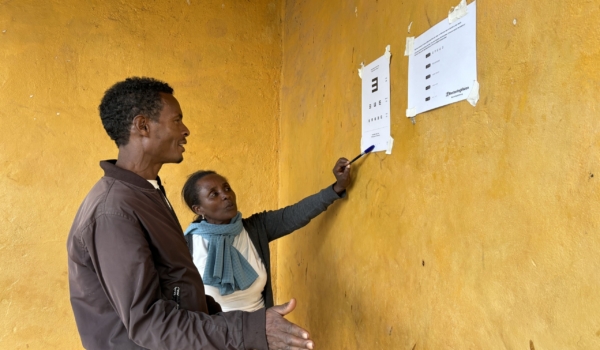What happens when Last Mile Health and our Ministry of Health partners develop a pilot program and determine that it’s an effective tool for training community health workers? We work together to replicate that success—and improve on it.
In 2021 and 2022, Last Mile Health and Ethiopia’s Ministry of Health designed and piloted an innovative integrated refresher training for community health workers—a module blending digital self-learning and in-person elements—with the goal of decreasing costs while improving learning gains. The first blended learning training module, in reproductive, maternal, newborn, and child health, was a clear success: participants made strong gains in both knowledge and practical skills, while the costs of training were reduced by nearly 40% compared to conventional in-person training.
Based on the success of the pilot module, the Ministry asked Last Mile Health to expand the blended learning approach to additional modules of training. With Ethiopia’s Health Extension Program employing more than 40,000 community health workers, this represents an enormous opportunity to build and scale the success of effective, cost-effective training—ultimately improving accessibility, knowledge, and skills for health workers who provide life-saving primary care in rural and remote communities.
Communicable and non-communicable diseases: a major community health burden

Ministry of Health and Last Mile Health personnel review instructional design at the November workshop.
In partnership with the Ministry, Last Mile Health has entered the planning phase of the next blended training modules. First on the list: communicable and non-communicable diseases. “The Ministry of Health chose this module because it’s one of the major areas they are working on,” explains Dr. Ruth Diriba, a technical advisor on Last Mile Health’s Ethiopia team.
In Ethiopia, 44 out of every 100 deaths are due to non-communicable diseases, with 60% of these deaths occurring before age 50. Communicable diseases—including respiratory diseases and tuberculosis—also rank among the leading causes of morbidity and mortality. With a high prevalence of diseases going undiagnosed, a growing proportion of patients present with complications at diagnosis, emphasizing the need for screening and timely care and treatment. High-quality training for those closest to patients—community health workers—will support high-quality primary care, an important step in primary prevention and management of diseases across Ethiopia.
“Whenever I want to read, I refer to the content on my tablet.”
To initiate the planning of the new modules, the Ministry of Health and Last Mile Health conducted a workshop in November 2022 to develop a blended learning instructional design. In addition to instructional design experts and content experts from the Ministry and regional health bureaus, four community health workers (nationally referred to as health extension workers) took part in the workshop. They shared their experiences using the pilot module, offering a vital, first-hand perspective from those who will be using the new modules in their training and work.

Zekerech Zenebe, a community health worker from SNNP Region, discusses blended training with the Ministry of Health, regional health bureau, and Last Mile Health teams.
“Learning using our tablets was a new experience for me,” explained Zekerech Zenebe, a community health worker from Damot Gale Woreda in SNNP Region’s Wolaita Sodo Zone. “The application was easy to use. It did not require internet connectivity and was easily accessible. This made it easy to be used anywhere, not limited to the training sites or health posts. I have used it in my routine work. Whenever I want to read, I refer to the content on my tablet.”
The workshop produced instructional design documents that will guide the Ministry and Last Mile Health as they develop blended learning content for the upcoming modules. For community health workers like Zekerech, blended training—and the resources available long after training is complete—represents the chance to sharpen skills, improve knowledge, and provide better care. “It’s a big milestone,” says Ruth.





